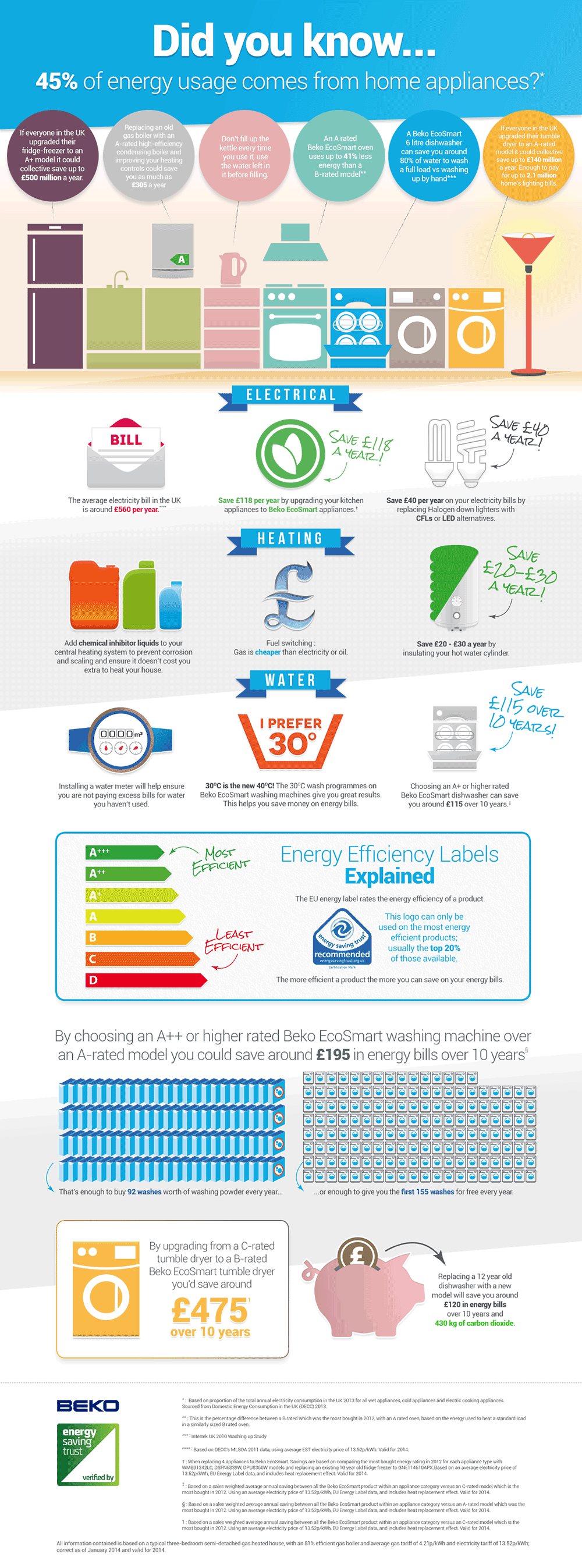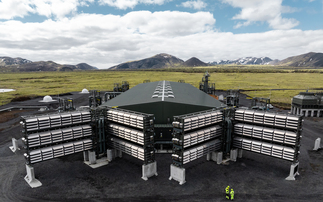Beko's top tips for slashing energy consumption from electrical appliances and heating
Click here to enlarge the infographic
 Nearly half of a household's energy bill comes from the cost of running kitchen appliances, such as washing machines, dishwashers, refrigerators and ovens, according to research by the Energy Saving Trust.
Nearly half of a household's energy bill comes from the cost of running kitchen appliances, such as washing machines, dishwashers, refrigerators and ovens, according to research by the Energy Saving Trust.
Even if people adopt the most energy efficient behaviours, they will struggle to reduce energy consumption on older and inefficient appliances - particularly those that guzzle power when they are switched on 24/7, such as fridges and freezers pushing up costs and carbon emissions.
Consumers are increasingly being urged to trade in old appliances for more efficient products that can save them money in the long run. For example, an average dishwasher costs around £40 per year to run, but a new one typically costs £12 per year less than and older one and will use less water, EST found.
Research by Global Action Plan (GAP) earlier this year found that consumers are currently paying about £300 per year to power domestic appliances throughout their homes, totalling £8bn across the UK. But by switching to more energy-efficient appliances, an average home could cut its bills by £99.
Meanwhile, using EST figures, appliance manufacturer Beko found that a household could save nearly £118 per year if it was to replace all of their appliances with its EcoSmart range.
George Mead, marketing manager for Beko, said it was now working with retailers to try and teach shoppers about the value of buying more efficiency goods.
Even the EU's Ecolabel scheme has been accused of confusing customers rather than helping them. As the scale starts at A+++ many shoppers may believe their A-rated appliance is the best on the market when in fact it is ranked as the fourth most efficient.
"Consumers are often confused by the energy efficiency ratings of products," explains Mead. "They were introduced a number of years ago but now most new white goods will have an A rating at the minimum so A+++ isn't necessarily the clearest way to explain how green a product is.
"By talking to our consumers we've found that equating money savings with eco efficiency makes green products much simpler to understand."
Understandably, many consumers are reluctant to pay seemingly high upfront costs for new appliances, when they feel their old ones work perfectly well.
But GAP's report found a lack of national initiatives to boost the sale of energy efficient goods. It highlights a range of ways that countries have encouraged consumers to buy greener appliances over the years.
French consumers, for example, are rewarded with tax credits for buying efficient appliances, while in the US from 2009 to 2012, consumers received cash rebates from the government. Brazil, meanwhile, offered a free energy efficient appliance to poorer households from 2008 to 2010.
With the EU now looking set to agree an energy efficiency target for 2030, helping consumers cut their demand is likely to move further up the agenda over the coming years.
But until new policies are brought into play, UK customers are being encouraged to study the potential benefits.
"Large appliances such as fridge freezers are switched on, kept on, and in use every day throughout the year," adds Mead. "Similarly, over a third of UK households are fitted with water meters, meaning consumers are becoming more aware of their own water usage, particularly through washing machines and dishwashers.
"Therefore, by investing in an eco-friendly appliance, consumers can be sure that they'll be making savings in the long run."







